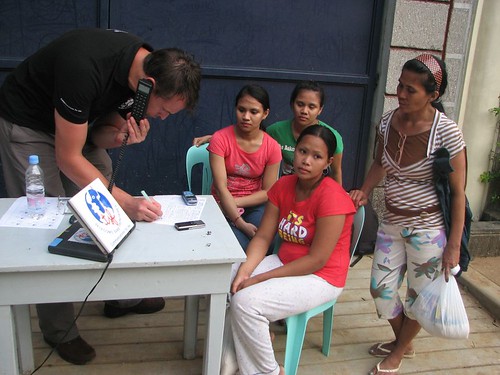Special to Dispatch from Petra Nemcova, Founder and Chair, and Phil Caputo, Executive Director, Happy Hearts Fund
When a disaster strikes somewhere in the developing world, the UN Office of the Coordinator of Humanitarian Affairs (OCHA) generally issues an appeal for donations to assist in recovery and clean-up. Sometimes, the disaster makes global headlines and funds come pouring in (think: the 2004 Tsunami). Sometimes, though, disaster can unfold slowly, like drought in the Sahel. And sometimes, the disaster occurs in a country whose leadership has generally hostile relations with donor countries (e.g., Zimbabwe).
 By Ingrid Madden
By Ingrid Madden
The World Food Program suffered a devastating loss last week in Pakistan. But their work continues elsewhere. Via the UN News Center, the WFP is still hard at work in one of the world's most dangerous places: Somalia.
The attack on the World Food Program headquarters in Islamabad was a tragedy and a crime. It was also symptomatic of a deadly trend in international security. Last year, 268 humanitarian aid workers were killed, kidnapped, or seriously injured in violent attacks. This represents a 61% increase of attacks on aid workers over the past decade. This increase is not just because there are more aid workers in the field today.

By Adele Waugaman
This week has seen a devastating series of events in the Pacific.
Samoa was hit by an enormous Tsunami yesterday. Here is some dramatic footage from the Associated Press.
Yesterday we heard from UN High Commissioner for Human Rights Navinathem Pillay, celebrating the first-ever World Humanitarian Day and marking the six-year anniversary of the Baghdad bombing that cost 22 UN staff members their lives. Today, the son of Sergio Vieira de Mello, the accomplished diplomat who was the UN's Special Representative in Iraq at the time, pens a moving op-ed in The Washington Post. The focus is on ensuring that what happened to his father does not happen to more of the thousands of humanitarian workers braving dangerous enviornments in the world today.
It is high time for the international community to face its responsibilities and stop hiding behind humanitarian action. The world must stop using humanitarian efforts as a fig leaf. It can no longer avoid action while putting its conscience at rest by sending humanitarian actors into the killing fields. There are lives at risk.
And on this day, because of their courage, dedication, generosity and humility, humanitarian workers deserve our respect. We should not only praise their work but also remind the world that we must protect them, that we must impress on warlords that if they have any humanity left, they should protect and assist these workers. We must remind the world that humanitarian workers are neutral and help those in need, whatever their color, race, religion or political beliefs. They deserve our efforts and our thanks.
We've made it a habit to thank UN peacekeepers for the hard work that they do; take a moment to appreciate the risks that humanitarian workers take to bring concrete benefits to the lives of others.
(image from Wikimedia Commons)
 By Navi Pillay, United Nations High Commissioner for Human Rights. This item is cross-posted at Huffington Post
By Navi Pillay, United Nations High Commissioner for Human Rights. This item is cross-posted at Huffington Post
August 19 is a date that is etched deep in the consciousness of the United Nations and the memories of those involved in humanitarian and human rights work around the world: the day in 2003 when 22 people, mostly UN staff, were killed in cold blood by a single bomb at the Canal Hotel in Baghdad.
It was by no means the first time that humanitarian aid workers, human rights defenders, peacekeepers and others working to improve the lot of the disadvantaged had been deliberately targeted by ruthless forces determined to create instability or subvert the basic laws and norms on which civilized society depends. My own organization, the Office of the United Nations High Ccommissioner for Human Rights, experienced its first loss of staff on 4 February 1997, when five members of the Human Rights Field Operations were killed in Rwanda.
And sadly, since 19 August 2003, there have been numerous other assassinations of individuals and further bombs – most notably the one in Algiers on 11 December 2007 which took the lives of a further 17 UN staff members – targeting UN and NGO staff. And I have just learned that two more UN staff are among those killed on Tuesday by a suicide bomber in Kabul. I would like to offer my deepest condolences to their families and colleagues.
In the case of the Baghdad and Algiers bombs, the perpetrators of these crimes were terrorist organizations. However, in other cases, the killers have sometimes acted on behalf of a government, or for organs meant to be under the control of governments.
Killing those who are trying to help others is a particularly despicable crime, and one which all governments should join forces to prevent, and – when prevention fails – to punish. It is therefore appropriate – as a first step – that last December the global forum for all the world’s governments, the UN General Assembly, agreed to designate 19 August as World Humanitarian Day.